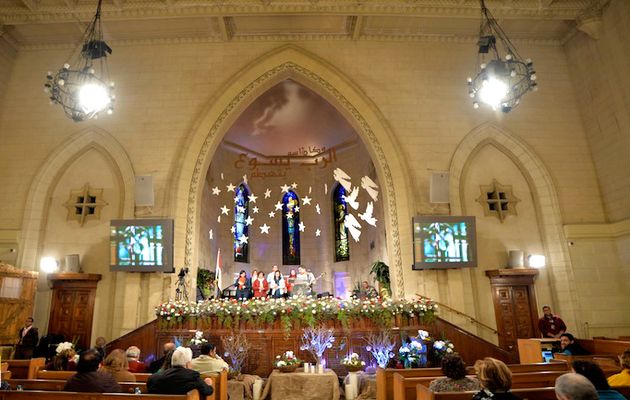According to the government, 508 Coptic, Orthodox, Protestant, and Catholic churches have received its approval since February. At the same time, eleven churches were shut down.
 Kasr El Dobara Evangelical Church in Cairo./ Egypt scene (CC)
Kasr El Dobara Evangelical Church in Cairo./ Egypt scene (CC)
The Egyptian government has legalised 168 new legal church buildings in the country.
The requests of Egypt’s Coptic Orthodox, Protestant, and Roman Catholic churches, to formally register facilities long functioning as centres of worship, were approved on November 30 by a cabinet committee.
A total of 3,730 requests were submitted for approval, pending review of structural soundness and compliance with local regulations.
Last February, the first 53 church buildings were approved, and, according to the government, a total of 508 have received its approval since then.
MORE THAN 80 PROTESTANT CHURCHES APPROVED
Egypt’s Protestants have requested the license of 1,070 church buildings. Forty-two were approved in this most recent batch, bringing their total to more than 80.
Prior to the new law passed in August 2016, it was very difficult for churches to be recognised by the government. Local authorities could delay or deny paperwork for licenses, often on security grounds, to placate objections by neighbourhood Muslims.
The law was controversial, but it was designed to streamline the process, allow for judicial review, and transfer final approval from Egypt’s president to local governors.
CABINET COMMITTEE TO REVIEW CHURCHES
The law also established a cabinet committee formed by the Prime Minister and the Ministers of justice, housing, antiquities, and others, to review church requests to license existing church facilities.
Andrea Zaki, President of the Protestant Churches of Egypt, said he was “pleased”, because “the process has been slow in the beginning, but I think going forward it will be better”.
“The government is gaining steam and taking seriously its obligations under the law. Churches also are becoming more familiar with the required procedures”, Zaki told Christianity Today.
“SOMETIMES LOCAL OFFICIALS COMPLICATE THE PROCESS”
However, Ishak Ibrahim, religion officer with the Egyptian Initiative for Personal Rights (EIPR), argued that “if the easy cases have taken this long, what happens when they consider the difficult ones”.
According to Ibrahim, the process is slow because “sometimes local officials complicate the paperwork and other times, the government yields to the security situation if local Muslim neighbours object”.
ELEVEN CHURCHES SHUT DOWN
Although the 2016 law prohibits closure of a church where worship was previously conducted, the EIPR released a report stating that since the cabinet committee began its work, there have been 15 churches under review.
Eleven churches were subsequently shut down; only two had the issues solved.
Additionally, the government has prosecuted attacks on Copts; last month, a court gave the death penalty to an alleged ISIS supporter who murdered a Coptic doctor.
“CHURCH APPROVALS ARE GOOD SIGNS”
“These sentences show the government is serious in applying citizenship. Too often in the past, no one would be held accountable”, said Zaki.
The President of the Protestant Churches of Egypt recognised that “there are certain problems in certain villages in Upper Egypt, and radicals exploit them to create more difficulties”.
“We need to deal with them wisely, but the court verdicts and the church approvals are good signs”.

Las opiniones vertidas por nuestros colaboradores se realizan a nivel personal, pudiendo coincidir o no con la postura de la dirección de Protestante Digital.
Si quieres comentar o